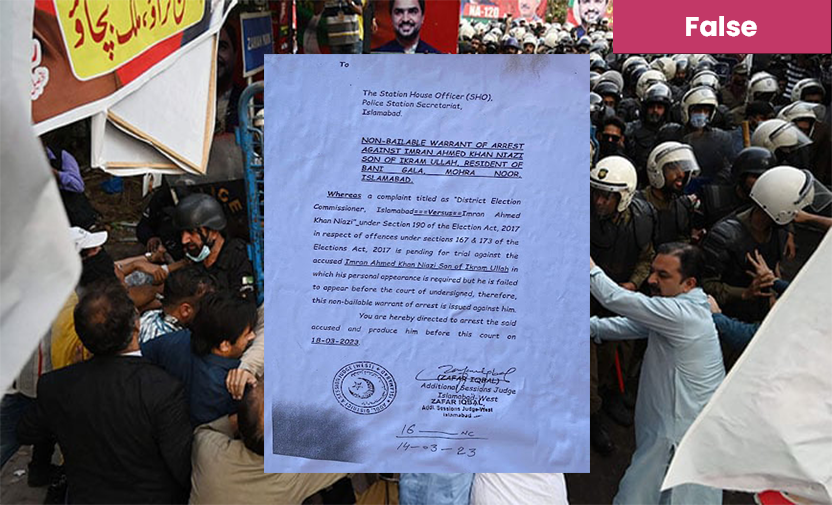
Claim: Law enforcement agencies were acting strictly in accordance with a court order and upholding the rule of law when they attempted to arrest Imran Khan at his Zaman Park residence on 14 March 2023.
Fact: Soch Fact Check spoke to six lawyers who believe the Zaman Park operation was not conducted in a lawful manner and was not required by the relevant court order. Statements by politicians, journalists, and social media users claiming otherwise are misleading and missing context.
Background
The non-bailable arrest warrant in question was issued by the Additional Sessions Judge (ASJ) West Islamabad on 14 March 2023. The purpose of the warrant was to ensure Khan’s attendance in court on 18 March. Khan’s legal team had previously applied for an exemption from physical appearance in court, which was rejected on 13 March 2023. However, the Islamabad Police began the Zaman Park operation on the very day that the order was issued, four days before the hearing in which Khan’s attendance was to be secured, and prior to giving him any chance to challenge the warrant.
While speaking to the media, DIG Operation Islamabad Shahzad Bukhari, who was responsible for leading the Zaman Park operation, said that he was just following the court order and upholding the law against a fugitive from justice. Rana Sanaullah and Maryum Aurangzeb made similar claims in their press conferences, which can be viewed here and here, respectively. Articles published during the operation by Dawn, Aljazeera and Geo News also claimed the operation was complying with a court order and that actions taken by the state were routine and within the ambit of the law.
This claim has already been challenged by the Supreme Court Bar Association of Pakistan (SCBAP), which comprises of Supreme Court lawyers and is currently presided by Advocate Abid Shah Zuberi, who could be seen arguing against the legality of the Zaman park operation publicly. In a statement issued by the SCBAP on 15 March 2023, it is said “Any form of violence is not acceptable in a democratic country governed by rule of law and constitution. The police excess being committed in Lahore to arrest the former Prime Minister in a warrant issued by a Magistrate is excessive and not in accordance with law and sheer violation of fundamental rights of the citizens of this country.”
In addition to this, Ishtiaq A. Khan, President Lahore High Court Bar Association (LHCBA) and Sabahat Rizvi, Secretary LHCBA also issued a press release on 15 March 2023, condemning the use of coercive force (teargas shelling, use of sticks and water cannon) by the police against PTI protesters in Zaman park on 14 March 2023. The press release further also states that the higher judicial forums must take notice of the ongoing political and judicial crisis. The statement states that PTI Chairman Imran Khan has already provided an undertaking according to CrPC Section 76 promising to appear in court on 18 March 2023, as stipulated in the non-bailable arrest warrant. The LHCBA condemned police action in spite of the presence of the undertaking.
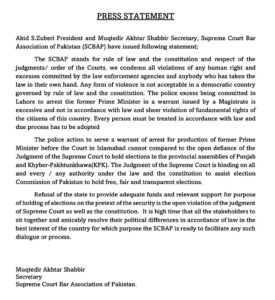
Abid S Zuberi, President SCBAP and Muqtedir Akhtar Shabbir, Secretary SCBAP have issued this statement. A copy of this statement was provided to us by senior court reporter Saqib Bashir.
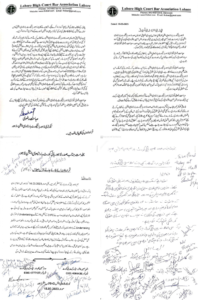
A copy of the official press release can be found on the official LHCBA website – https://lhcbar.com/2023/03/27/press-release-dated-10-03-2023-2/
Soch Fact Check obtained legal documents from one of Khan’s legal representatives and subsequently spoke to five more lawyers to ascertain whether the warrant was correctly interpreted and appropriately executed. All six lawyers agreed that the violence that took place at Zaman Park was avoidable and that the warrant was misinterpreted to justify a disproportionate and legally unnecessary use of coercive force. Moreover, it is important to note that the issuance of the warrant was not a guilty verdict; it was a step in a process to ensure attendance in a matter that was, and remains, sub judice.
Fact or Fiction?
Soch Fact Check reviewed a copy of the non-bailable arrest warrant against Imran Khan, which was issued after his legal team filed a request for Khan to attend court via video link rather than in person and requested to nominate Advocate Ali Bokhari to appear on his behalf. The warrant reads, “You are hereby directed to arrest the said accused and produce him before this court on 18-03-2023.” Although the operation to arrest Khan began on 14 March, all six lawyers we spoke to told us that the attempts to arrest Khan before 18 March were not strictly required by the court order.
According to Advocate Asad Jamal, the purpose of the warrant was to secure Imran Khan’s attendance. The premature execution of the order before Imran Khan’s challenge to it could be taken up by a higher forum, meaning that the order was used as a pretext to arrest Imran Khan before the order could be challenged rather than actually to ensure his presence on 18 March 2023.
Moreover, several lawyers told us that the court’s rejection of Khan’s application for exemption on the grounds of threat to physical safety and inability to travel with ease was itself an extraordinary step taken by the court. While discussing the issue of the court’s rejection of Imran Khan’s request for exemption from physical appearance, Advocate Salaar Khan said, “Unfortunately, this truncation of the interim period deprived Imran Khan of the opportunity to meaningfully challenge the warrant before the 18th. While considering the avoidance of the police, one must also separately consider the potential avoidance of the court. Khan’s previous non-appearance in front of the court is still significant and diminishes the latitude afforded to any accused person. Thus, although his previous application for personal exemption was dismissed, it is worth questioning the absolute necessity of this warrant.”
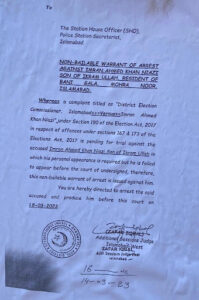
A copy of the non-bailable arrest warrant provided by Imran Khan’s lawyer Intazar Hussain Panjutha.
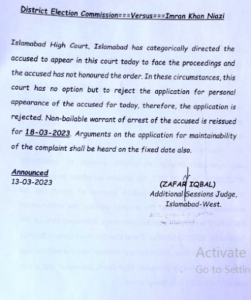
A copy of the court order rejecting Khan’s request for physical exemption from court. Provided to us by his lawyer Intazar Hussain Panjutha.
Several of the lawyers also confirmed that before the use of coercive force, the state should have followed the routine process to declare Khan an absconder and issue an advertisement in this regard. According to Salaar Khan, “The arrest warrant, dated 14th, mandated that Khan be produced in court on the 18th of March. Therefore, any use of violence to enforce the warrant on the 14th becomes unnecessary. Additionally, when resistance to [Imran Khan’s] arrest became apparent, the police could have gone back to the court and initiated the mechanism of absconding, which could have been initiated, making the resort to force avoidable.” This is to say that the police officials should have reported back to the court with the update that they have met resistance in their attempts to arrest Imran Khan, and the court would be able to direct the law enforcement agency towards the announcement of Imran Khan absconding the law, which would have completely avoided physically hurting or attacking any civilians.
Criminal lawyer Farah Yousafzai also emphasized that the fact that the non-bailable arrest warrant which was used to carry out the operation specified that Imran Khan is a resident of Bani Gala, and, according to the law, the police could not have enforced the same warrant at his Zaman Park residence. Procedurally, a warrant must be served at the location listed on the legal document; nevertheless, hundreds of police backed by paramilitary forces moved on Zaman Park early in the day on 14 March. This use of force in Lahore was, therefore, a political choice and anything but routine.
Yousafzai added that in a case such as this, once the DIG Operations was directed to comply with the non-bailable arrest warrant, his team should have reverted back to the court with the information that they believed Khan was not in Bani Gala, but at his Zaman Park residence instead. After this, the court would have issued a requisition or a transit warrant and directed the relevant locality magistrate to ensure compliance. According to Yousafzai, the fact that all of these necessary procedures were skipped and the Islamabad Police travelled directly to Lahore to arrest Khan at Zaman Park made the operation legally dubious at best.
Neha Touseef, a judicial law clerk at the Islamabad High Court, concurred with Yousafzai’s statement, saying, “If the police officers are unable to execute the warrant, the same must be communicated to the Court with evidence so that the Court can publish a written proclamation requiring him to appear at a specified place and time. The power to use force and to damage property is not provided to the police officials in order to secure the arrest of a person against whom a warrant has been issued.”
Advocate Shafiq Ahmad echoed the same and told Soch Fact Check that upon encountering resistance against arrest, the police should have reported back to the court and sought a legal remedy rather than using the state’s monopoly on violence by directly targeting civilians in the confines of a residential neighbourhood, thereby treating the local residents as collateral damage.
Moreover, while speaking to ARY News, PPP politician, celebrated lawyer and Zaman Park resident, Aitzaz Ahsan, questioned why such a large number of police from Quetta, Lahore and Islamabad were involved in arresting just one person. He also questioned the use of tear gas, asking, “Is he [Imran Khan] a terrorist?” Ahsan also told Neo News that he had never seen so many police and senior police officers out to enforce a warrant before, going on to state, “they left to conduct the operation four days before the warrant said he was to be presented [in court], so where would they keep him for four days? In prison, in jail? Those same police officers can’t answer that question.” When asked for his legal opinion, he said, “Excessive use of force, even in compliance with a lawful order, is illegal. It makes the whole operation illegal.”
In short, the non-bailable arrest warrant issued on 14 March 2023 was only meant to ensure Khan’s physical presence in court on 18 March 2023. No legitimate legal interpretation of the warrant necessitated law enforcement to use teargas, rubber bullets, or live ammunition against civilian protesters within the confines of a residential neighbourhood while causing collateral damage to the local residents. More appropriate and routine non-violent legal remedies were available, and the extraordinary actions taken by the police went well beyond whatever they were empowered to do by the warrant.
While interpreting events, it is essential to understand the facts as well as the context in which those events are taking place: to misrepresent or erase context undermines the audience’s ability to understand the facts. According to Meta’s third-party fact-checking guidelines, posts with “content that implies a false claim without directly stating it,’ including “reporting on a false claim made by a third-party without questioning its veracity” can be labelled as Missing Context on Facebook and Instagram. The International Fact-Checking Network – of which Soch Fact Check is a signatory – also states a claim should be rated as Missing Context when “fact-checkers encounter content that would be misleading without additional information”. Several news articles and op-eds about the events of 14 March fall under this category, as they reported that the operation was in accordance with a court order without clarifying that a significant number of legal experts believe what happened at Zaman Park was not legally justified.
In Pakistan, legal instruments such as warrants are often used by governments and state authorities in the pursuit of political objectives. However, as Asad Jamal told Soch Fact Check, the Code of Criminal Procedure – according to which a non-bailable warrant of arrest is issued – is subordinate to the constitution and cannot be used to supersede the constitutionally given right to be presumed innocent before proven guilty, or impeach the fundamental rights guaranteed under the constitution.
Although there may be some lawyers who believe the operation could be legally justified, a large number of legal experts believe the operation did not follow established legal processes, and the legality of the operation has itself been challenged in court. It must be noted that the Lahore High Court Bar Association (LHCBA) and the Supreme Court Bar Association Pakistan (SCBAP) are both legitimate legal forums, consolidating legal opinions of the larger legal community and have both released comprehensive statements to the press highlighting their legal disagreement with the implementation of the non-bailable arrest warrant. Media reports that claim the operation was legal seem to have taken government statements regarding the warrant at face value without obtaining independent legal opinions on what the warrant actually permitted or required. Statements made by government spokespeople regarding the legality of their own actions should not be uncritically reproduced as fact; this is especially true when government actions are putting the lives of citizens at risk.
Virality
On Facebook, we found posts sharing the same claim here, here, here, here, here, here, here, here, here, here, here, here, here, here, here, here, and here.
Soch Fact Check has also verified other claims regarding this operation here and here.
Conclusion: The Zaman Park operation was not conducted in accordance with a court order. Statements by politicians, journalists, and social media users claiming otherwise are misleading.
